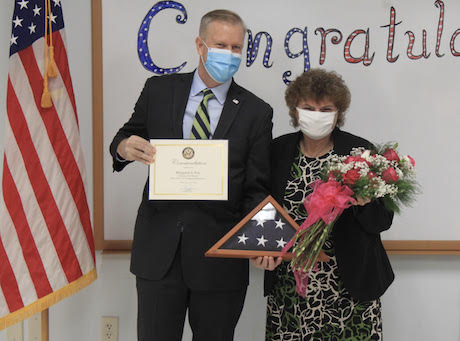Ever-changing policies and regulations, coupled with insufficient and reduced funding from Albany, have created a “very fluid environment” that prevents the Genesee County Health Department from looking too far ahead when it comes to its continuing battle against the COVID-19 pandemic.
Public Health Director Paul Pettit conveyed that message to the Human Services Committee of the Genesee County Legislature this afternoon as he presented his departmental review via Zoom videoconferencing.
“We’re kind of entering phase three of this pandemic – the contact tracing piece and the testing – and now with the vaccinations,” Pettit said. “It’s going to be a long haul, but working together I believe we’ll get there over the next four to six months, hopefully.”
Despite the uncertainty regarding funding and vaccine availability, Pettit reported that he couldn’t be prouder of the health department staff – employees working as part of a shared services agreement with Orleans County.
“They’ve gone above and beyond for quite a long time, operating in response mode, which is tiring and stressful,” Pettit explained. “But they’ve risen to the challenge and I just want to tell the committee how proud I am of them. And I appreciate all of the support that the committee and the legislature give, not only to the health department but to all the county staff.”
The health department has been dealing with the pandemic for nearly a year, and that concentrated focus on helping those who have been infected or have had to be quarantined due to contact with an infected person has relegated other departmental initiatives to the back burner.
Pettit said the health department has received $264,576 in COVID-specific grant funding for use through 2022, and has spent about $135,00 thus far, with almost $75,000 of that for employee overtime and other expenses.
“Fortunately, we’ve had those grant funds to cover that, but still that’s a lot of money in overtime to meet the needs of contract tracing and the other activities that have occurred over the past 10 to 11 months,” he said.
He said he is expecting additional funds for vaccination and is waiting to see how that money will be funneled from the state to the counties.
“As we have talked about many times, this will be a significant effort over the next four-, six-plus months to vaccinate our entire population, so there is going to be a lot of expense around that,” Pettit said. “It’s a big effort in front of us so, obviously, these grant funds when they come will be very important to us to offset our public health and local funds – and making sure we’re utilizing them the best we can.”
In an effort to faciliate the county's vaccination clinic scheduling process, the Human Services Committee voted to approve a contract for staffing services from Coastal Staffing Inc., of Naples, Fla., for six months at an estimated cost of $65,500.
Pettit's departmental review touched upon several areas, as follows:
FISCAL PROFILE LOOKING AHEAD TO 2021
Article 6 is the avenue by which public health departments receive state aid revenue.
Pettit said Gov. Andrew Cuomo is looking to reduce Article 6 funding by 5 percent across the board, which means the local health agency will receive about $38,000 less than expected – down from $757,129 to $719,273.
Concerning performance incentive funding, Genesee/Orleans is anticipating about $10,000 this year, he said.
The health department is facing a 20-percent cut in funding for its lead and tobacco grants for the period of April 1, 2020 through March 31, 2021, Pettit said, and may lose all of the funding for its rabies grant (about $15,661).
“In the executive (state) budget proposal there is a cut to the rabies grant – potentially a full extinction of the grant,” he said. “We spend a lot more than that on rabies every year. This grant, particularly, pays for all of our animal clinics that we’re required to do by law and pays for the vaccines for that. Also, for educational things that we do and it offsets some of our post-exposure costs, which is well in excess of $100,000 per year.”
Pettit said he is advocating to get that money put back into the state budget.
CROSS-JURISDICTIONAL SHARING WITH ORLEANS
Genesee is into the ninth year of its CJS relationship with Orleans with seven full-time shared administrative staff and one emergency preparedness assistant.
“We have a common shared Board of Health, and we continue to leverage that relationship and have shown it to be fruitful during the COVID response and our ability to utilize staffing across the lines to supplement and move resources as needed,” Pettit reported.
He said the counties have finished their strategic planning project in 2020, but have had to hold off on their quality improvement and workforce development plans. He also said they are hoping to gain accreditation from the Public Health Accreditation Board by 2022.
Pettit added that the CJS agreement recently was expanded to include the Wyoming County Health Department.
COMMUNITY HEALTH ASSESSMENT/IMPROVEMENT PLANS
Pettit said the updated work plan submitted to the state in December focuses on chronic disease, mental health and substance abuse issues.
He said the GOW (Genesee-Orleans-Wyoming) Task Force is continuing to meet, with the program formally coordinated by Genesee/Orleans Council on Alcoholism and Substance Abuse.
He also praised Ashley Rodriguez, a new Public Health associate, for contributing to the department’s COVID response.
“She is a huge piece of our efforts related to COVID, and is bilingual, which is very helpful (when communicating with Spanish-speaking residents).
ENVIRONMENTAL INITIATIVES
Pettit said the county’s septic replacement program has been successful, with 14 households earning reimbursements of more than $86,000 thus far.
“It’s a program that our folks who live in certain areas of the county on certain creeks are taking advantage of,” he said, adding that the program runs through 2022.
PUBLIC HEALTH EMERGENCY PREPAREDNESS
“Preparedness is COVID and we continue to spend a lot of time there,” he said, mentioning the department’s preparedness app – a joint venture with Emergency Management.
He said COVID has enabled the agency to build its Medical Reserve Corps, a volunteer group that could assist in the case of future health crises or emergencies, and said county employees have been actively engaged in the continuity of an operation plan that is designed to integrate the various departments as efficiently as possible.
EARLY INTERVENTION/3-5 PRESCHOOL
The department’s most expensive program, the Early Intervention (EI) and 3-5 Preschool services are expected to cost $601,500 in the coming year.
Pettit said 136 children are in EI and another 156 in the 3-5 Preschool.
He said there is a push for a shift of fiscal responsibility to schools, noting a "significant increase in transportation costs” since we have to now bus all of our kids out of the county. We don’t have a local center-based program any longer.”
As a result, he is projecting a 91-percent increase in transportation costs from 2020.
“Ultimately, until we get another center-based program back in the county, unfortunately all of our children in Genesee and Orleans counties have to be transported out to surrounding counties for those type of services,” he said.
In a related development, the Human Services Committee recommended the legislature accept an EI allocation of $31,982 from the New York State DOH for the period of Oct. 1, 2020 through Sept. 30, 2021.
WEIGHTS & MEASURES
Pettit said a shared W&M director with Orleans County has streamlined the program to realize significant savings for both counties.
In 2020, the division inspected more than 650 devices and collected $16,762 in fees.
CORONERS/MEDICAL EXAMINERS
Coroner cases increased in 2020 from around 170 to 193, with 61 of those cases being handled by the medical examiner’s office in Monroe County, Pettit said.
He emphasized the need to appoint a new coroner to replace Jeff McIntire, who resigned. The county is currently operating with three coroners instead of four, but can request assistance from Orleans County if necessary.





